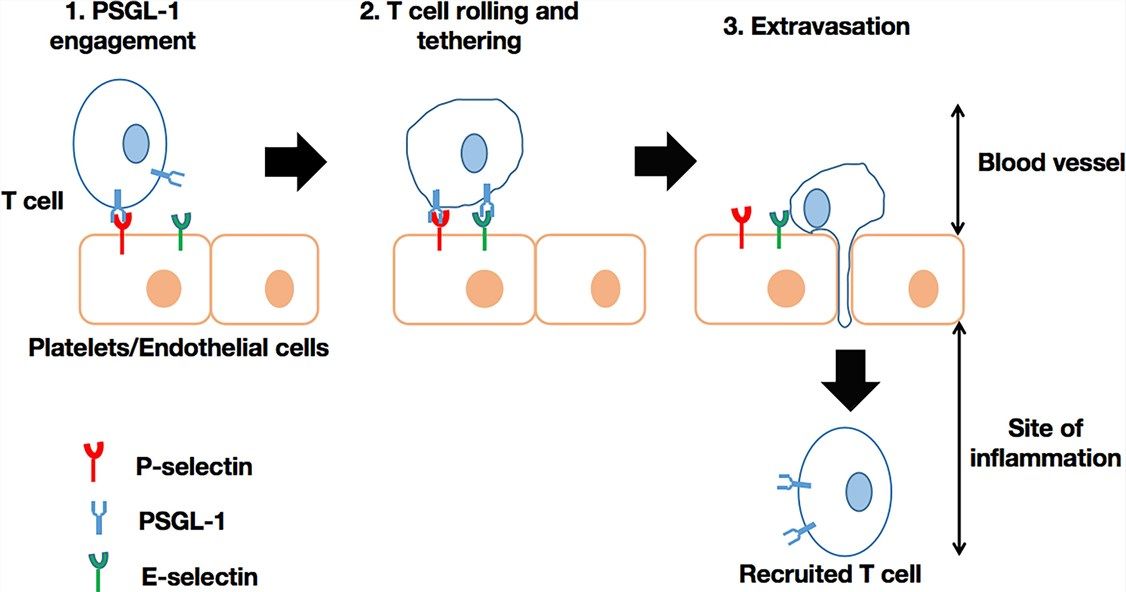


P-selectin (Psel), a carbohydrate-binding Protein, can initiate inflammatory response by activating leukocytes in mammals. Dimeric mucin was discovered to be a ligand of selectins in the 1980s, which is now named Psel Glycoprotein ligand 1 (PSGL1). It is a 120 kDa homodimeric mucin. PSGL1, an important selectin ligand, plays a part in conveying leukocyte transport into inflamed tissue. And it can be expressed on myeloid, lymphoid, and dendritic cells. PSGL1 can bind all three selectins. Therefore it has the highest affinity for Psel on leukocytes in comparison with other ligands and is necessary for adhesion to Psel. Besides, PSGL1 also functions as an immunosuppressant. It is shown that PSGL1 expression inhibits the multiplication of activated T cells. Meanwhile, it is proven that caspase-independent apoptosis of activated T cells can be impelled by selectin-induced crosslinking of PSGL1. Similarly, PSGL1 deficient regulatory T cells can’t suppress T cell-dendritic cell interactions causing continuing T cell activation and intensive severity of experimental autoimmune encephalomyelitis.
 Fig.1 T-cell recruitment via PSGL1/selectin binding. (Zaongo, et al., 2021)
Fig.1 T-cell recruitment via PSGL1/selectin binding. (Zaongo, et al., 2021)
Restraint of Psel/PSGL1 interactions is important to treat those disorders as a result of maladaptive acute or chronic inflammatory responses. The functions of Psel/PSGL1 in a good deal of disease states have resulted in the synthesis of many small molecule inhibitors to target these interactions. They are designed by modifications of sialyl Lewis x (sLex) and also be limited by their low potency and off-target toxicity. An amazing approach is to develop a PSGL1 mimetic inhibitor to saturate the undefined activator of PSGL1 and hinder PSGL1 involvement and pursuant signaling events. It would be intriguing to research whether this approach could inhibit the immune inhibitive function of PSGL1. This tactic profits from the minute study of PSGL1 glycosylation patterns during the process of T cell apoptosis. Selectin can not bind with an expression of the native protein, as PSGL1 must be decorated by fucose and Sialic Acid. And it becomes functional after being sulfated on tyrosine residues. The modification determines the interactions between PSGL1 and selectins. It is important to deeply understand the glycosylation state of PSGL1 and the function of the aglycone and glycan constituents of PSGL1 in mediating its effect as a negative regulator of T-cell responses. That may provide a valued perception of the mechanism and therapeutic translation.
With the dual aims of better understanding Psel-PSGL-1 interactions and of producing small-molecule Psel inhibitors, a chemosynthetic approach has been developed to generate GSnP-6 which is a glycopeptide analogue of PSGL1 as an inhibitor of selectin ligation in vitro and in vivo. GSnP-6 is a kind of glycosulfopeptide mimics of N-terminal PSGL1. Key features of its synthesis include an efficient stereoselective route that has to lead to multi-gram scale synthesis of the C2 O-glycan and replacement of hydrolytically labile tyrosine sulfates with stable, isosteric sulfonate analogues affording compounds with high affinity to Psel (Kd 14-22 nM). GSnP-6 has high affinity and stable chemical properties. GSnP-6 potently blocks Psel/PSGL1 interactions in vitro and in vivo and represents a promising candidate for the treatment of diseases driven by acute and chronic inflammation.
CD BioGlyco has a strong team of experts in glycopeptide synthesis. We provide custom synthesis of high-quality PSGL1 glycopeptide mimics inhibitors for customers around the world. In addition, we provide good after-sale service for free. If you have needs in this field, please feel free to contact us.
Reference
